Danzig – A Labour of Love
Saothar a spreag sinn
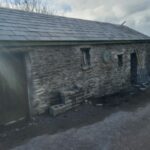
Spring 2023
Danzig is an iconic stone building on Cape Clear Island. It stands at the top of Leaca Joan, a steep road rising from North Harbour. From here the road divides to Baile Iarthach or to South Harbour and beyond.
History and Folklore
Over 200 years old Danzig has a rich history. And more has come to light in recent months as the building has been carefully restored.
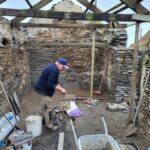
A new life for an Iconic Building
Saol nua don seantigh
Danzig is to become a store and display center for Lavender products from the Island. Later its planned to include Craft Gins, whiskeys and other products from Cape Clear Distillery. It has room both for display and also for some interesting exhibits for visitors.
As little as possible
Ná bac leis mura bhfuil gá leis
Our approach was to do as little as possible consistent with preserving Danzig for future generations. While we replaced the original slate we retained much of the supporting timber-work. So too the lichen covered roof tiles. Meanwhile the original wooden windows were also carefully restored.
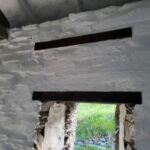
Revealing its Secrets
Ag scaoileadh leis na rúnta
As the works progressed this intriguing building shared some of its long-hidden secrets. We found evidence of a traumatic fire and we assume that this was probably the original thatched roof. Also discovered and partially replaced was the original loft. Signs were found of a long closed upper window. Many of the original beams are plainly much older. We presume that these were salvaged from old fishing boats of the 19th Century. Some bear unmistakable signs of their former use.

Two Families
Dhá chlann, ach an rabhadar in adharcha a chéile ?

Hard to believe that this modest building was once home to two families. So the second Northern entrance was restored to its original opening. Intriguingly while preparing for a new internal floor we found an ancient quern stone buried underneath.
Other artifacts from days gone by
Iarsmaí eile ós na sean laethanta
More recently Danzig was used to store unused items, many from days gone by. While most were in poor condition some we could slavage. This did not include the drag, a type of poor mans cart or sled pulled by a horse or donkey. These were very suitable for the island’s narrow, stoney roads. But others such as various tools, a cradle, a broken telescope and oars are being returned as the building as its contents are restored.
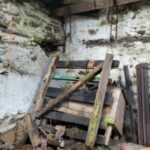
Restoring its Northern doorway
Ag cur an doras arais mar a bhí
Originally Danzig had two doors, one for each family. The Northern door was replaced with a much wider door which suited the buildings more recent use for storage. So this entrance was
restored to its previous size. Amazingly, we found in the debris right in this spot a perfectly sized
lintel and stone threshold. These too were restored to the building as can be seen from the photo.
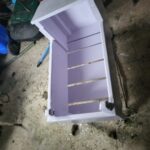
Why was it called Danzig ?
Cén fáth an t-ainm seo Danzig ?
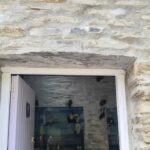
Islands like Cape Clear, inhabited by seafarers were familiar with World affairs. Danzig, today Gdansk in modern Poland was a city once disputed by Germany and Poland. And at the same time a dispute also arose between two families about the ownership of this building. So the name stuck. Fortunately, this was resolved in the best possible way since a boy and a girl from both families later fell in love and Danzig became theirs. And more recently while most
of those who worked on it were locals, they also included a Pole and a German who worked to restore this historic building.
Keening Lady
Bean caointe

Cait Carey, the last keening lady on the Island lived in this house in her old age. Keening was traditionally performed at funerals and was a form of ritualised crying/singing similar to sean-nós singing. Deriving from the Gaelic tradition in both Ireland and Scotland the tradition came to an end towards the beginning of the 20th Century. Her last keening and the last on Cape Clear Island took place in 1918 .This was performed by Cait Carey to mourn the passing of a young priest, an tAth Risteard Ó hAlloráin Richard O’Halloran who died tragically in that year.
A Well
Tobar
Behind Danzig there is a well and this has also been uncovered. In years to come we plan to restore this also.
A Labour of love
An saothar a spreag
The restoration of Danzig was a labour of love for all concerned. We all enjoyed our journey into the past and we hope that our work will be appreciated by many for years to come.

Cléire abú. Lus Liath abú. Danzig abú.


